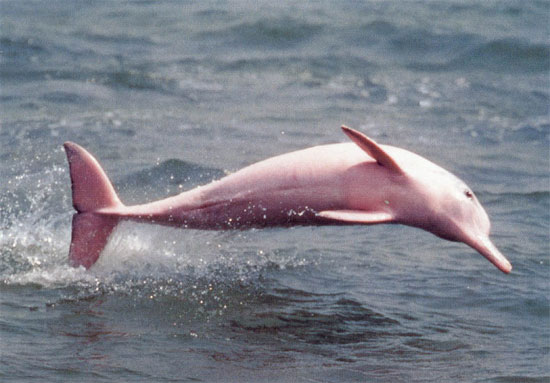Pink dolphin - the symbol of Hong Kong is disappearing
According to the South China Morning Post newspaper (Hong Kong), experts have just announced a significant decrease in the number of pink dolphins in Hong Kong. This information comes amid concerns that Hong Kong's iconic pink dolphin could disappear due to pollution, sea encroachment and an increase in sea traffic.
Experts say Hong Kong's pink dolphins are declining at an unprecedented rate. They warned that this rare fish could disappear completely from the waters of Hong Kong if authorities did not take measures to control pollution and destroy the marine environment in this special administrative zone.

Pink dolphin in Hong Kong.
Strong sea encroachment and development - including the construction of the Hong Kong - Zhuhai - Macau bridge and the construction of a third runway at the airport of Hong Kong - along with pollution and delivery activities unprecedented increase in maritime traffic, believed to be the cause of a sharp decline in the number of pink dolphins in Hong Kong, the animal was blessed by the city when the Hong Kong transfer from the British government took place Mainland China in 1997.
The appearance of pink dolphins has been recorded in Hong Kong since the 1600s. The number of pink dolphins has decreased from 158 in 2003 to 78 in 2011. Figures for 2012 were released in January. coming, will be a very low number.
The number of pink dolphins also increased rapidly, with 3 cases recorded only in the last April. These dolphins are suspected of dying because their mother's milk is poisoned.
Janet Walker, a spokesman for the dolphin monitoring organization, said: 'Half of the pink dolphins that die every year are baby dolphins and immature dolphins. If the plan for the third airport runway continues and the Hong Kong - Zhuhai - Macau bridge is completed, a number of pink dolphins will drop dramatically and pollution will increase even more. " Janet Walker added: 'The dolphins are dying more and more clearly affirming our marine status. They are the factors that monitor marine conditions in general. so are we".
- Admire the special rare pink dolphins
- Hong Kong people 'cry out' because of light pollution
- Photos of Hong Kong in the past and now
- Hong Kong atmosphere is cleaner during the demonstration days
- Pink dolphin in Japan
- Establishing the bank of DNA of rare and precious dolphins
- Pollution causes one-fifth of Hong Kong residents to leave
- Unique pink dolphins live in fresh water environment
- Typhoon Nida hit Hong Kong
- Red alert bird flu in Hong Kong
- Hong Kong encourages clean coffins
- Pandemic flu broke out in Hong Kong
 Surprised: Fish that live in the dark ocean still see colors
Surprised: Fish that live in the dark ocean still see colors Japan suddenly caught the creature that caused the earthquake in the legend
Japan suddenly caught the creature that caused the earthquake in the legend A series of gray whale carcasses washed ashore on California's coast
A series of gray whale carcasses washed ashore on California's coast Compare the size of shark species in the world
Compare the size of shark species in the world